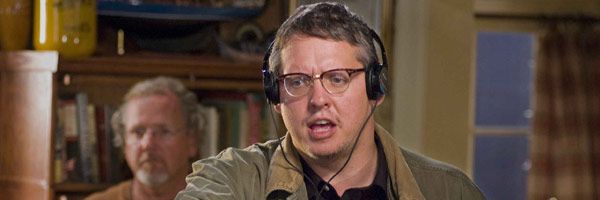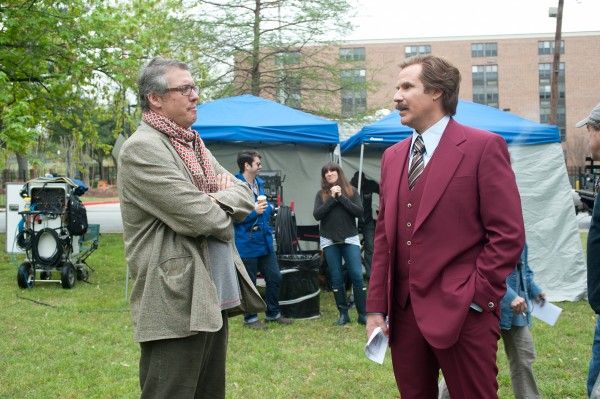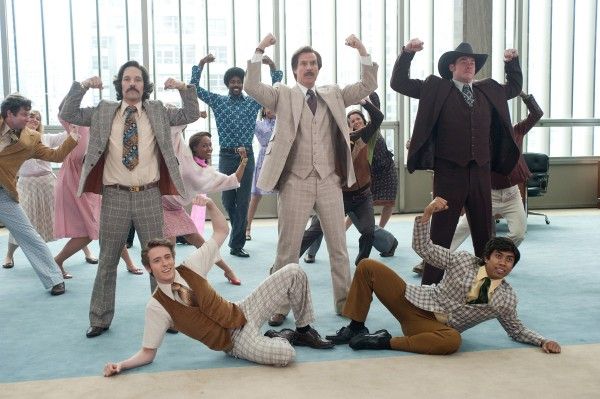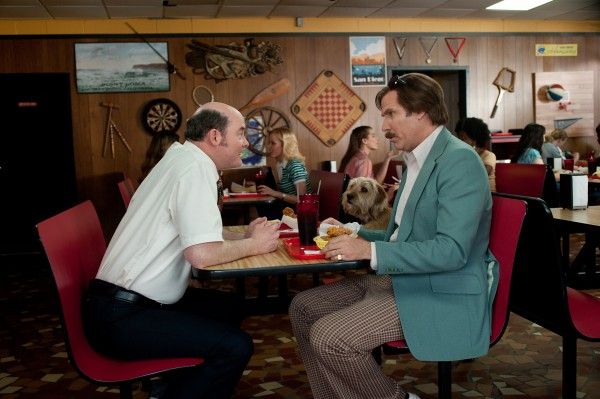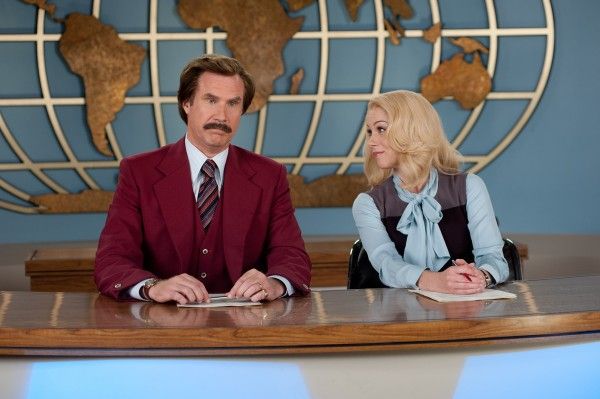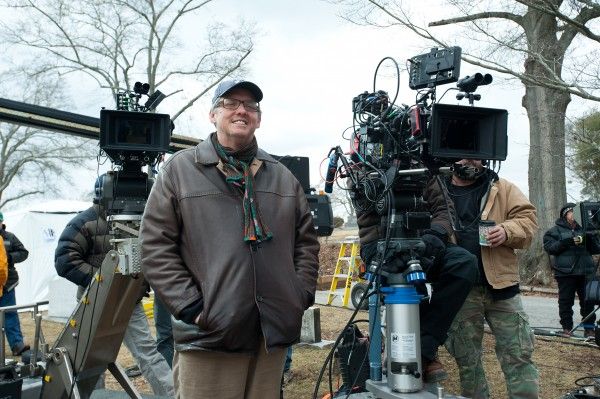Filmmaker Adam McKay is one of the best comedy directors around, and he’s also one of the smartest. While he’s had massive hits with films like Anchorman and Talladega Nights, McKay makes it a point to thread timely satire into most of his films in addition to the absurd comedy. The Other Guys tackles financial and corporate corruption, and his latest pic Anchorman 2 is not-so-subtly a satire on the 24-hour cable news media.
In anticipation of the Blu-ray release of Anchorman 2: The Legend Continues on Tuesday, April 1st (which includes a bevy of extras and three cuts of the film), I recently spoke with McKay on the phone. The filmmaker discussed how he keeps the satirical focus of his films intact despite their improvisational nature, his shock at Paramount’s willingness to release the R-rated alternate cut of Anchorman 2 into theaters, his fondness for the Step Brothers score, and much more. He also talked about his first foray into drama with The Big Short, which he calls one of the more ambitious things he’s done. Read the full Adam McKay interview after the jump.
Collider: First of all, I have to say congratulations because when you guys said you wanted to release an R-rated cut with all new jokes into theaters, I thought there was no way in hell that would actually happen.
ADAM MCKAY: (laughs)
Because people talk about wanting to do stuff like that all the time but it never, ever happens. How did that come about? Was Paramount immediately receptive to the idea?
MCKAY: I gotta give all the credit to Adam Goodman, Paramount, Rob Moore. They are ballsy because we did the cut and I was completely fine with it just being on Blu-ray, that’s kind of what I thought was gonna happen—and by the way there was even a chance they were gonna say, “We’re not even gonna do it on Blu-ray,” and that wouldn’t have shocked me, like “Hey I get it, you guys have a big company, you need to put these movies out.” And they called me and said, “We’re putting it out in theaters,” and I was like, “Whoa, really?” And I think I even had a moment where I was like, “You are aware that it’s like two hours and twenty minutes long,” where I sort of questioned it, and they were like, “We don’t care. We think it’s great and we think there’s enough of a fanbase for it and we think it’ll be great for the Blu-ray and the DVD and the whole legend of the character,” and God bless ‘em man. They did it and they actually made some money, I couldn’t believe it.
Yeah I was one of the ones to go out and see it because I was just shocked that it actually happened.
MCKAY: (laughs) God bless you, man. It’s a long night. It is two hours and twenty minutes long. I told people, “Take a bathroom break halfway through!”
I was excited to see the new jokes because I was a fan of the first cut, but I was also really fascinated by the experiment of it, to see essentially the same movie with entirely different dialogue.
MCKAY: We were wondering has it ever been done? Ever?
I can’t think of precedent for it.
MCKAY: I don’t think it’s ever happened. I think there are movies where they say they improvised a lot but they’re really not; they do a couple of different lines. We were saying like in the history of movies, has this ever happened? Which I don’t know if it’s the greatest title ever to claim, but it’s still kind of cool.
When you’re choosing the alternate takes to include in this extended cut I assume you’re earmarking stuff during the editing process. Was it tough to go decide which lines made it into the extended cut or were they all basically second choices?
MCKAY: That was a lot of it, yeah there were runs that we loved that we couldn’t get to work in the theatrical. There were bits that were just a little too hard-edged or a little too strange or a little too dirty that always really made us laugh. A great example is Champ and Brian in the back of the van talking about how Brian gave Champ’s mom gonorrhea, and then he starts asking how his mom is and he goes, “Oh she died yesterday.” When we were shooting that we were crying with laughter. There’s a bunch of those in there, I could name about a dozen, maybe two dozen. So those were all easy, those went right into the cut, and then sometimes you had to scrape a little bit more. You had to look and go, “Well we had a pretty good joke here that went in the theatrical, is there even a usable one underneath it?” The good news was usually there was, there was at least a solid joke. And then we just tried to replace everything we could, like voiceover and incidental jokes and background jokes. I don’t think we quite replaced everyone, there might be like six or seven from the original in there, but we came pretty darn close.
It sure felt like it was different dialogue for the entirety of the film.
MCKAY: That’s great.
The development history of Anchorman 2 has been well covered over the years with the studio initially not being interested, then you guys having the idea of turning it into a musical, and then the final surprising turn when Paramount actually said yes. It looks like there’s a featurette on the Blu-ray that gets into the history of Anchorman 2 as a project. How deep does that go into the different incarnations that you guys had?
MCKAY: I’m about to give you a great answer: I don’t know (laughs). I don’t think I ever saw it. I don’t know what the making of documentary is, I mean I’m sure I’m in it and I’m sure a bunch of us are interviewed and I’m sure they go through the history, but I actually haven’t seen that. There’s so much extra stuff and bits and pieces on these things; I’ve seen most of it, but I did not see that.
I was revisiting the Step Brothers Blu-ray the other night and that one’s packed. Usually for comedies they just release bare-bones discs.
MCKAY: That one’s jammed. The coolest one on the Step Brothers Blu-ray is the making of the score with Jon Brion. It’s Chris Thile the world class mandolin player and Nels Cline from Wilco and this legendary drummer. That is the coolest little documentary they did of the making of the score. By the way, that’s another one I didn’t see until it came out and I was like, “This is awesome!” So I’ll be watching a lot of these extras at the same time you are.
The score on that movie is fantastic.
MCKAY: I’ve gotta give Jon Brion credit; I always say that score is amazing. Because it’s such a silly comedy everyone dismisses it, but it is one of my favorite scores—and I know it’s in a movie we did, but it’s one of my favorite scores of all time. Punch-Drunk Love and that.
It’s genuinely great. You have a knack for threading social commentary or something a bit more serious into most of your movies, like The Other Guys gets into financial and corporate corruption and obviously Anchorman 2 has a lot to say about the current state of news. Since your filming process is so improv-heavy and there’s a lot of exploration during production, is it tough to keep those socially-minded throughlines intact? I know you guys start with a pretty solid script.
MCKAY: What we do is we look for ideas that almost no matter what you do through the filter of the idea, there’s some satire to it. Like the very nature of showing vain anchorpeople in the media right away has some satire, so even when it gets strange and odd it always kind of plays through that. Same with The Other Guys, the idea that it was an old-fashioned action cop and Wahlberg in a new computer forensic cop and Ferrell, right away had a dynamic that was kind of interesting. Hopefully if we’re doing it right you kind of can’t go wrong as long as you’re staying in the right key of the movie. If your question is do we sometimes get out of that key? Absolutely. There’s sometimes some runs where it’s like, “What the hell did we just do?” Although we’re getting better and better and don’t do it quite as much.
Well it’s something I appreciate because a lot of comedies nowadays are funny, but they feel disposable.
MCKAY: Our theory on it is it makes the movie denser. It gives it some grounding and it makes it easier to be funny when you’re talking about something that’s real and actually going on and that we all know is going on, as opposed to just, “it’s about a relationship,” which can get a little thin. Not to say that we sometimes don’t get thin.
Well speaking of which, I wanted to ask about the Michael Lewis adaptation The Big Short, which you’ll be writing and directing. Is that going to be more of a straight drama and have you started digging into that one yet?
MCKAY: I have an idea for it. I got very lucky with that one because it’s one of my favorite books and I asked about it and it hadn’t quite stalled out, but it was over at Plan B and because there had been a couple of Wall Street movies that came out, it wasn’t really moving ahead with any great velocity; so I was able to get involved with that. I have some ideas on how to do it, it’s not gonna be a comedy. It will be dramatic but I wanna do some stylistic choices as far as how it’s presented, because I think the story is so epic and huge and I just want to make it as populist as I can so people can really enjoy it and it doesn’t get bogged down in the language, but yet at the same time people can understand it. It may be one of the more ambitious things we’ve jumped into, so I’m really excited. I’m gonna start writing next week on it and it’s gonna be really fun. If we can pull this off and get this to play like that book plays—I’m kind of giddy about it.
Well I think it’s a perfect marriage of director and material. I live in Oklahoma, so when I went to see Anchorman 2 I thought it was funny to see that you kind of tricked all these people into watching a criticism of the state of the 24-hour news cycle.
MCKAY: (laughs) You know that’s what Ferrell and I said afterwards. The movie obviously did really well and got very good reviews, but I think everyone was like, “We thought it was gonna do $500 million!” Paramount was really great with it too, Adam Goodman’s like, “Hey, this is a strange movie with satire running through it, yet it’s playing in like Oklahoma and Kansas and Iowa.” So that’s always been what’s so fun about collaborating with Will Ferrell, is he’s game for doing this kind of stuff—there’s a lot of people that wouldn’t be—and that we get our movies played in states like Mississippi and Louisiana and then we’re talking about how the media basically became a pandering ratings machine (laughs). It’s pretty fun. We get to make ourselves laugh too, so what better combination is there than that?

